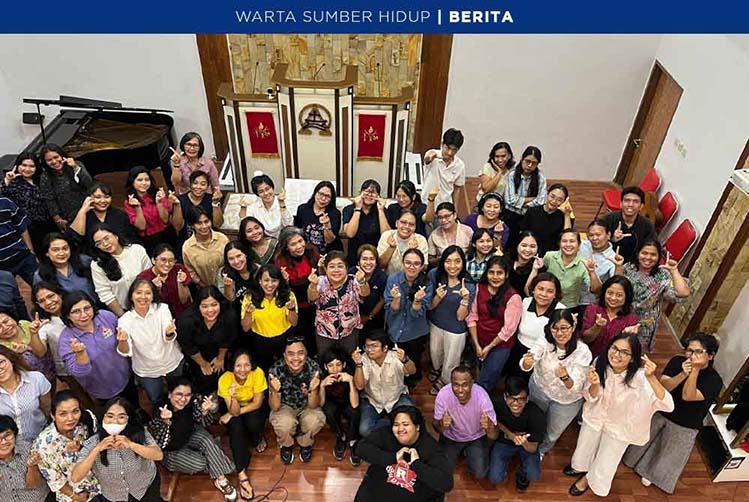Bible Talk | Lady Mandalika
The phrase "Let's eat" in Indonesian culture is commonly interpreted as a form of hospitality and a social invitation to share. These two simple words are loaded with the meaning of hospitality, solidarity, and respect for others. However, when this expression is read in the light of the Bible, especially in the narrative of Genesis 37 & 50, its meaning expands far beyond simply fulfilling physical needs. Through Lady Mandalika's theological reflections in LAI's Bible Talk, Joseph's story shows that food is not only about satiety and hunger, but also about power, inequality, and reconciliation that shape human relationships with one another and with God.
The story of Joseph and his brothers shows this dimension clearly. In Genesis 37:23–25, after they threw Joseph into the well, the text records that they then sat down to eat. The scene is ironic in that while Joseph was in agony, his brothers were enjoying a meal by the well. The act of eating here is no longer a symbol of togetherness, but rather an assertion of power and dominance. Food turns into a sign of who is powerful and who is powerless. The banquet seemed to be a statement to his brothers that Joseph's dream of sheaves standing upright and being worshipped by his brothers' sheaves would not happen. Thus, food in this event becomes a symbolic tool to affirm hierarchy and reinforce the inequality of relations.
The same theme recurs in the story of Joseph in Potiphar's house. In Genesis 39:6, it is mentioned that Potiphar entrusted all his affairs to Joseph, “except his own food.” This sentence seems simple at first glance, but it holds layers of deep meaning. In ancient tradition, "what one eats" is often a symbol of status and the limits of power. Potiphar had complete sovereignty over the food, something that suggests that ultimate control remained with him, not Joseph. Thus, despite Joseph's apparent power, he was still under a restrictive social system. Even when Joseph was thrown into prison on the accusation of Potiphar's wife, the pattern of “falling into the well” was repeated. In all these instances, food comes together with power and vulnerability, signaling a recurring cycle of inequality.
However, Joseph's story does not stop there. When famine struck the land of Canaan, Joseph, now ruling in Egypt, used his wealth and abundance of food not to oppress, but to help. In Genesis 45:23, he sent his father ten donkeys loaded with “what was best in Egypt”, including wheat and bread. This is where an important theological reversal occurs: food that was once a symbol of oppression is now a sign of reconciliation. Joseph, who was thrown down a well and left to starve, now shares food as an expression of love and forgiveness. The act of sharing food becomes a liturgy of peace, where wounds are healed and fractured relationships are restored.
This dynamic is close to the contemporary situation in Indonesia. Food fulfillment programs such as "free nutritious meals" are good initiatives, but they need to be critiqued ethically and theologically. When many people still experience hunger not because they are lazy, but because the socio-economic system makes them powerless to access food sources, then the reality of inequality in the story of Joseph is actually still repeated. Food here is not just a matter of the stomach, but a matter of justice, welfare and human dignity. Thus, feeding should not be done from a position of subjugating power, but from a spirit of equal love. Seeing others not as objects of pity, but partners in equal life.
Furthermore, the dinner table in the biblical tradition is often a space of encounter and restoration. From Abraham's banquet to Holy Communion, the act of eating together symbolizes acceptance and unity. Similarly, in the story of Joseph, the banquet in the Egyptian palace symbolizes the reversal of power into love. Those who were hungry now feed, those who were betrayed now forgive. Lady Mandalika invites readers to reinterpret the meaning of "Let's eat" not only as a social invitation, but as an ethical call to build fair, safe and loving relationships. In a world of inequality, "let's eat" becomes an invitation to share life without oppressing, to restore broken relationships through a true banquet of love.
Thus, the narrative of Genesis 37–50 shows that food is never neutral. It can be a means of oppression as well as a tool of reconciliation. From the dry well to the royal table, from hunger to satiety, from power to love, Joseph's entire story invites us to realize that behind every loaf of bread shared lies a struggle for faith, justice, and love. So, "Let's eat" is not just a polite cultural invitation, but a theological call to a table of equals, where every person is honored, every body is fed, and every relationship is restored by soul-satisfying love.




















